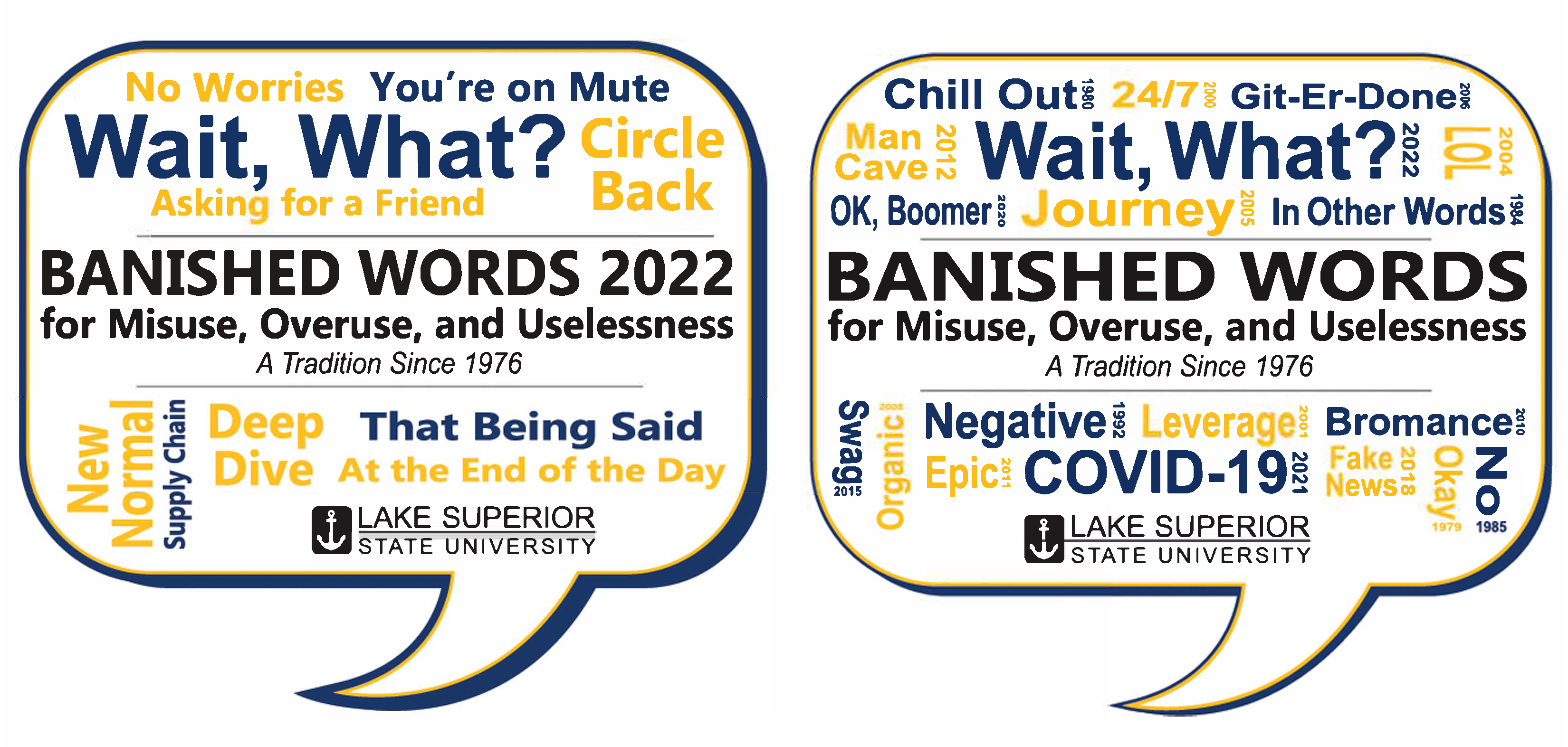Since 1976, Lake Superior State University (LSSU) in Sault Ste. Marie, Michigan has worked diligently to “uphold, protect, and support excellence in language” by, simply put, banishing words that were "so last year."
"Banished" may be too harsh of a term. Really, the university public relations team strongly encourages the avoidance of “words and terms that are overworked, redundant, oxymoronic, clichéd, illogical, nonsensical — and otherwise ineffective, baffling, or irritating.”
In 2022, that list is made up of 10 words and phrases that a lot of people — especially those working in an email-heavy environment — are just plain sick of hearing at the end of the day. People from around the world send LSSU their “mock-series” entries for the tongue-in-cheek list, which was announced on Dec. 31, 2021.
The most irksome phrase in 2021: “Wait, what?”
“These two four-letter words should not go together under any circumstances, according to many nominators and the contest judges from the LSSU English Department, because the two-part halting interrogative is disingenuous, divergent, deflective, and other damning words that begin with the letter ‘d,’” wrote the university.
To circle back, most of the terms nominated were colloquial in nature, meaning that they are commonly used in everyday, ordinary conversations — and in some instances, in cases where formal or literary language should be used.
“Most people speak through informal discourse. Most people shouldn’t misspeak through informal discourse. That’s the distinction nominators far and wide made, and our judges agreed with them,” said Peter Szatmary, executive director of marketing and communications at LSSU, in a news release.
“Also, seven of the 10 words and terms that LSSU banished last year reflected real-world concerns about COVID-19, while three could be categorized as quotidian. This year, as the global pandemic persists along with adaptations to it, the inverse occurred. Seven of the 10 words and terms to be banished are more conversational-based, with the other three applying to the coronavirus,” he added.
As the world kicks of the new year and accepts its new normal, the university suggests that it’s the perfect time to throw out old, overused phrases like the ones below. As part of our banished words deep dive, we’ve listed them in order of popularity, or lack thereof.
- Wait, what? LSSU calls this phrase a “failed response to a statement” that is both misused and overused.
- No worries. Not only is this term used as an incorrect substitute for “You’re welcome,” it also embodies insensitivity, argued the university. If someone is indeed worried, the last thing they may want to hear is someone telling them to do otherwise.
- At the end of the day. This phrase was first banished in 1999 and has made the list again more than two decades later because it is considered a “useless expression.” Some consider a “day” to be an imprecise measurement, others note that whatever is going on may not end at the end of a given day.
- That being said. Simply put, nominators cited this phrase as “verbal filler, redundant justification, and pompous posturing.” It’s fancy talk for other perfectly acceptable transitions like, “however,” “but,” or even “that said.”
- Asking for a friend. The so-called friend is just a ruse. “This cutesy phrase, often deployed in social media posts in a coy attempt to deter self-identification, isn’t fooling anyone,” said the university.
- Circle back. First banished in 2002, LSSU has circled back to bringing the “evasive blanket terminology and smarty-pants puffery” term back on its 2022 list because its considered to be the most overused phrase if business and government since “synergy.”
- Deep dive. Admittedly, we're guilty of this too.
- New normal. Entering the third year in the pandemic, is any of this normalcy still considered new? The phrase was first banished in 2012 for its apathy and once again made the list as it suggests that some people haven’t come to terms what normal means in the first place, added LSSU.
- You’re on mute. We’ve nearly all been there. No explanation needed.
- Supply chain. By and large, this buzzword was often used towards the end of 2021 and issues surrounding the supply chain have become what LSSU called a “scapegoat of everything that doesn’t happen or arrive in time and of every shortage” seen during the pandemic.
As the news cycle grew weary of pandemic-related misinformation and people around the world remained unsure about best practices, so too did some words and phrases become overused. The last three phrases that make up the banished words list are derived from COVID-19 events as catchalls to express how the pandemic affected humankind.
“Say what you mean and mean what you say. Can’t get any easier, or harder, than that,” said LSSU President Rodney Hanley. “Every year submitters play hard at suggesting what words and terms to banish by paying close attention to what humanity utters and writes. Taking a deep dive at the end of the day and then circling back make perfect sense. Wait, what?”
More than four decades in the making, there is no shortage on the annoying word supply chain. In 2022, the playful list totaled more than 1,000 entries, all of which you can view by year by clicking here. No worries if you accidentally use these words; just don’t find yourself on mute when doing so.
Sources
“Banished Words List Year.” Lake Superior State University, https://www.lssu.edu/traditions/banishedwords/year/. Accessed 7 Jan. 2022.

